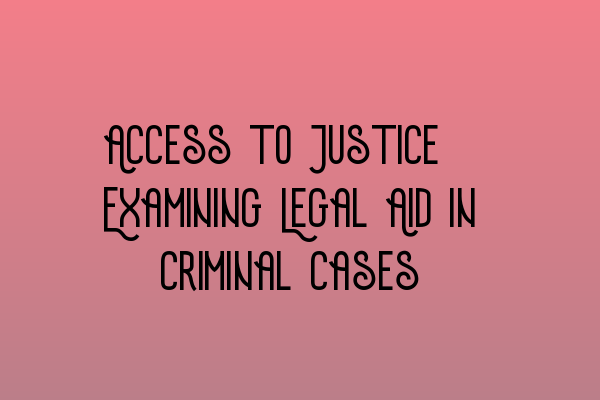Access to Justice: Examining Legal Aid in Criminal Cases
When it comes to criminal cases, access to justice is of utmost importance. Every individual should have the right to a fair trial and proper legal representation, regardless of their financial situation. That’s where legal aid plays a crucial role. In this article, we will delve into the topic of legal aid in criminal cases, its significance, and the challenges it faces.
What is Legal Aid?
Legal aid is a government-funded provision that ensures individuals who cannot afford legal representation can still receive assistance. It helps to level the playing field, enabling everyone to have a fair chance in court. In criminal cases, legal aid is instrumental in safeguarding an individual’s rights and ensuring a fair trial.
The Importance of Legal Aid in Criminal Cases
Access to justice is a fundamental right, enshrined in democratic societies. Legal aid in criminal cases allows individuals to seek professional legal advice and representation, ensuring that their rights are protected throughout the legal process.
Without legal aid, those who cannot afford to hire a solicitor would be at a severe disadvantage. This could potentially lead to wrongful convictions, as individuals without legal representation may struggle to effectively present their case or understand complex legal procedures.
Moreover, legal aid helps to uphold the principle of equality before the law. It ensures that justice is not only accessible to the wealthy but is available to all, regardless of their socio-economic background. This is crucial in maintaining a fair and just society.
The Challenges Faced by Legal Aid
Despite its importance, legal aid in criminal cases faces numerous challenges that hinder its effectiveness. One such challenge is the limited availability of legal aid funding. Over the years, government budget cuts have reduced the resources allocated to legal aid. This has resulted in restricted eligibility criteria, making it harder for individuals to qualify for assistance. As a result, many individuals are forced to navigate complex legal processes without proper representation.
Another challenge is the misconception surrounding legal aid. Some individuals believe that legal aid is only provided to those who are guilty or undeserving of support. However, legal aid is designed to ensure a fair trial for everyone, regardless of their guilt or innocence. This misconception creates public scrutiny and further undermines the support for legal aid.
Additionally, delays in legal aid determinations can significantly impact the timely resolution of criminal cases. The lengthy process of assessing eligibility can cause unnecessary delays, leading to a backlog of cases and prolonged periods of uncertainty for defendants.
It is imperative that we address these challenges and work towards a robust legal aid system that can effectively serve those in need.
Conclusion
Legal aid in criminal cases is a vital component of ensuring access to justice. It plays a significant role in preserving the fairness of the legal system and protecting the rights of individuals who cannot afford legal representation. However, the challenges it faces threaten its effectiveness. By recognizing the importance of legal aid and advocating for necessary reforms, we can strive towards a more just and equitable society.
